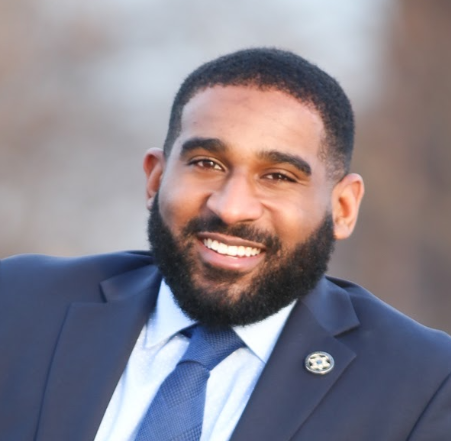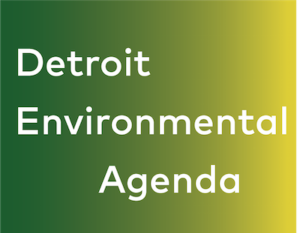Ken Snapp

Q: Where can people go to learn more about your biography? If not readily available online, please describe in 150 words or less, your relevant experience, public offices held (if any), involvement in environmental causes, and membership in any environmental organizations. If you currently hold office, describe any votes or actions demonstrating concern for the environment.
A: https://www.ksnapp.com/about
Community
Q: If elected, how will you work with Detroit residents to ensure that they benefit from and partake in the decision-making surrounding local development projects and that potential adverse impacts of those projects are identified, measured, monitored and mitigated? Moreover, how would you work to put more power into the hands of residents to maintain and revitalize their own communities and to access vacant land through the DLBA?
A: We must establish community benefit agreements, while using the core tenets of intersectionality, we can create policy for the historically oppressed and marginalized groups, with an emphasis on Black and Brown Detroiters. While creating these community benefit agreements, we also remember to uphold the agreement. Often we see that these agreements are broken and the community is then left misrepresented. I would put power back into our communities by establishing advisory coalitions within District 4. I would then take the input of my constituents and create policy that adheres to the voice of the people.
Q: If elected, what budget appropriations would you propose to increase investment in needed social and environmental services to help improve the quality of life and health of Detroit residents?
A: I am a major advocate for social goods and social justice. We must give citizens access to social goods so that we may start to build equity inside marginalized communities. Housing, health, and recreation are three major pillars for social goods. To find money available for these areas would be paramount for my office. Knowing that my district currently doesn’t have a recreational center is frustrating. I have many true progressive ideas that will fit the current systematic blueprint. Even though I have new ideas, I understand that community input and community benefit agreements are extremely important.
Public Health
Q: What long term solutions do you see for addressing vehicle speeds and making our streets safer?
A: In 2017 mayoral campaign, I suggested that we create a drag strip for car enthusiasts. Many folks didn’t understand why I would make the suggestion. Fast forward to 2021, we have a major issue with speeding and fatal crashes. We have become a reactive city instead of a proactive city. The city is currently installing speed bumps, but it doesn’t solve our problem. We must be creative, not only to combat speeding, but provide an outlet. The car community has requested a safe space for many years now.
True progressive leadership is being able to hear all parties and develop sustainable solutions. We must ensure safety for all citizens. We created bike lanes for bicyclists, I believe we can do the same for car enthusiasts.
Q: How will you work to reduce the negative health impacts of air quality on the residents of Detroit?
A: To reduce the negative health impacts of air quality, I will advocate for stronger policy to protect our citizens. Tiny PM2.5 particles are produced by nearby industries, including the Stellantis and General Motors facilities, as well as cars and trucks. They can penetrate the blood-air barrier and enter the bloodstream, contributing to health problems like lung cancer and heart disease. I believe we must educate our community on what conditions they are being exposed to.
A simple proactive measure is to install mature vegetated buffers in high pollution zones. We must urge the MDEQ/EGLE to require FCA to perform real analyses that safeguard our public health and environment.
Q: If elected, what actions will you take to work toward safer, healthier, and more affordable housing for all Detroiters?
A: One of the most important issues we are currently facing is how to properly address the over assessment of $600 million in property taxes. Homeowners have lost their property due to the over assessment. We must guarantee that this doesn’t happen again. Also we must create community benefit agreements that safeguard longtime residents. We must create equitable opportunities for home ownership.
In regards to safer housing, we must address the poorly weatherized housing stock, with old pipes, as well as potential lead, mold and asbestos problems. Looking for new ideas to provide aid and support for home repair. We must also ensure cleaning affordable water, free from lead.
In regards to health, we have to improve our status as a food desert. We have to provide more readily available access to fresh produce in a close mile radius.
Energy
Q: What are your priorities to reduce emissions and lessen the impacts of climate change in Detroit during your term in office?
A: As I stated earlier, the easiest thing we can do immediately, is provide mature vegetated buffers. I would advocate for vegetated buffers in high impact zones immediately. I would also be a strong advocate for more solar powered initiatives. Self-sustaining powered structures should be at the forefront of the energy debate. Creating opportunities for citizens to have access to solar energy would become a priority.
Q: What are your plans for helping the city transition to renewable energy and how will you ensure that the cost benefits and increased resilience that come from the use of renewables is made accessible to low-income and vulnerable communities across Detroit?
A: In two-thirds of the world, renewable sources of power are more affordable than carbon-based electricity. Many governments offer consumers and businesses subsidies for using sustainably-sourced power. These monetary incentives reduce the end cost of choosing renewable energy sources.By subsidizing renewables through tax breaks or direct payments, governments pay back a portion of these initial costs.
Being a leader for adopting innovative ideas will be a major course of action for me and my team. Presenting the ideas and inviting coalitions to discuss possibilities and implementation.
Recycling
Q: How can the city increase recycling, composting, and the use of post-consumer recycled materials, while addressing the city’s litter and illegal dumping problem?
A: Offer more opportunities to the citizens to get rid of waste. Adopt shredding programs that are already in place and publicize through community letters. We can look at adding more community drop off locations that are more accessible. We must also involve our children in this effort. We must educate early on so that we can have a long term effect.
Jobs
Q: What steps would you take to prepare the local workforce to take advantage of and be part of the movement toward a green economy, through qualifying for good paying infrastructure and clean energy jobs, amongst others?
A: I believe that we need to provide opportunities to the public to gain training and develop skills for better paying jobs. We also need to encourage employers to abandon systematically racist hiring tactics. We must look to new ways to create a stronger workforce in the city that is more diverse. We must create new opportunities for the historically marginalized and Green jobs critical to advancing solutions to economic disparities and climate change.
In addition to preparing residents for these jobs, we must create community benefit agreements that ensure that marginalized Detroiters will have a fair opportunity to acquire these new jobs. I would strongly advocate that the hiring process include on the job training for applicants.
Water
Q: How will you ensure that clean water is accessible and affordable to all Detroiters?
A: For years, water advocacy organizations have been fighting for water affordability. I would establish a water coalition with grassroots groups and develop an affordability plan that serves marginalized groups that have been affected long before Covid-19.
Q: How will you help municipal agencies and property owners integrate Green Stormwater Infrastructure (GSI) across the city to manage stormwater and reduce drainage charge fees for property owners?
A: Conventional piped drainage and water treatment systems are designed to move urban stormwater away from the built environment, green infrastructure reduces and treats stormwater at its source while delivering environmental, social, and economic benefits. I would look to adopt ideas from progressives states and cities who are already using green infrastructure tactics.
I would advocate for agencies to look into rainwater harvesting systems. The systems collect and store rainfall for later use. Phoenix, AZ adopted the idea over 40 years ago and has significantly reduced the pumping of groundwater.
Optional
Q: Please identify the top environmental concerns to you personally, identify the environmental issue in your community that is the most pressing, and what you would like to do as an elected official to address this most pressing concern.
A: I briefly talked about the Stellantis FCA Expansion on the Eastside. But this is a major concern in my district. FCA’s Jefferson North plant is already the largest VOC producer in Detroit by a wide margin, and a substantial increase at the Mack Avenue Assembly Plant means an extreme concentration of pollutants in an already polluted neighborhood. The 48213, 48214, and 48215 zip codes already have the highest asthma hospitalization rates in Detroit, and its residents are crying out for the MDEQ/EGLE to protect their health and the environment in their community. FCA must be required to revisit their analyses and come up with better alternatives that reduce VOC outputs.
As an elected official, I will demand an accurate data display of the emissions FCA’s operations will produce. I will advocate for FCA to be required to perform real toxic and alternatives analyses, and find ways to reduce their emission into our community.

